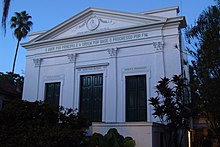人道教
外觀


人道教(法語:Religion de l'Humanité;或église positiviste)是實證主義哲學的創始人奧古斯特·孔德(1798–1857)創立的一種世俗宗教。該宗教的信徒在法國和巴西建造了人道教禮拜堂。[1] 。
在美國和歐洲,孔德的思想影響了其他人,並促成了倫理學會和「倫理教會」的出現,從而導致了倫理文化、宗教人文主義和世俗人文主義組織的發展。
起源
[編輯]孔德為實證主義學會創立了人道教,希望取得傳統宗教所具有的凝聚力。孔德與克洛蒂爾德·德沃(Clotilde de Vaux)兩人發生柏拉圖式戀愛,1846年克洛蒂爾德·德沃去世,孔德將其理想化。他確信女性價值觀體現了情感和道德的勝利。在未來以科學為基礎的實證主義學會中,也應該有一種宗教 能夠憑藉道德力量而擁有力量。[2] 1849年,他提出了一項曆法改革,名為「實證主義日曆」(positivist calendar),每個月份以歷史上最偉大的領袖、思想家和藝術家的名字命名,每天都紀念一位思想家。
參考
[編輯]- ^ Où peut-on visiter un temple positiviste ? (Where Are Positivist Shrines to be Seen?). [2007-10-30]. (原始內容存檔於2007-10-30) (法語).
- ^ Rollin Chambliss, Social Thought: From Hammurabi to Comte, Dryden Press, New York, 1954, p.424.
外部連結
[編輯]- Positivist Church of Brazil//Encyclopedia of Latin American History and Culture (頁面存檔備份,存於網際網路檔案館)
- English language site for Brazil's "Religion of Humanity"
- Olaf Simons, The Religion of Humanity (a structured collection of transcripts from English translations of Comte's major publications on the topic) (頁面存檔備份,存於網際網路檔案館)
- The Catechism of Positive Religion, Auguste Comte 1858
